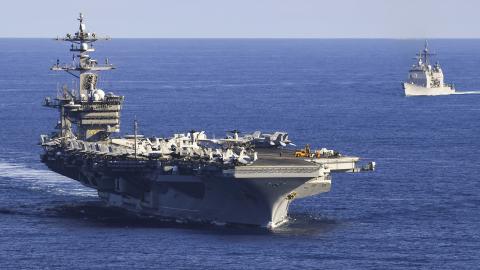The US has been supplying Ukraine weapons in its defensive war for a solid year now. At the same time, China’s threat to the US is, for the average American, certainly in its sharpest focus yet. A threat that seemed more abstract and far away was made all too real recently, with China’s brazen overflight of its spy balloon in our airspace. Following that, there was scorn from Chinese Communist Party officials when Biden officials tried to smooth over the incident diplomatically.
Navy Admiral Charles Richard ominously warned last year that Russia’s war in Europe was a “warm-up” — for a bigger conflict coming with the CCP. Alarm over the Chinese threat has led some to conclude, one year into Ukraine’s struggle, that continued support of Ukraine against Russia is an unaffordable distraction from China.
In fact, the opposite is true. The decision to back Ukraine is finally rebooting some elements of the defense–industrial base and an attendant healthy manufacturing workforce. This is essential for deterring China. But it will not be enough if the White House, Congress, military leaders, and the business community fail to seize this moment together and prepare the nation.
China is outgunning the US, engaging in reckless operational provocations, and scorning US diplomatic overtures. China is preparing for war. The US must urgently prepare for war with China to prevent one.
To do that, we first have to appreciate the scope of the problem. China has more ships than the United States. US Navy secretary Carlos Del Toro warned, “They have 13 shipyards, in some cases their shipyard has more capacity — one shipyard has more capacity than all of our shipyards combined.” China has a massive missile force and is on a trajectory to have as many nuclear weapons as the US (or more) and various ways to deliver them. It’s building more silos for ICBMs, and now has more ICBM launchers than the United States. The speed at which China is able to produce such quantities is breathtaking. One part of the explanation for the speed of production and fielding is that China’s fusion of the military and civil (MCF) sectors enables it to quickly, aggressively develop and build large numbers of advanced weapons platforms that take the US years to build.
Russia, although struggling to maintain its gains in Ukraine, is receiving Chinese financial backing and raw materials and electronic component parts that could be used for the war effort. Secretary of State Antony Blinken has been publicly sounding the alarm that China is considering sending arms directly to Russia. “Game changer” is an overused phrase. But it would be an entirely appropriate one if Chinese leader Xi Jinping decided to fully throw in with Putin.
The defense–industrial base has underpinned American military preeminence and purchased the peace Americans have been accustomed to since the Second World War. But flat-line defense budgets in real terms, as well as the mothballing of manufacturing and the offshoring of critical supply chains since the fall of the Berlin Wall, have left the United States without the ability to flexibly and quickly produce the necessary weapons in the numbers required.
Had the US chosen not to support Ukraine, it would still be woefully ill-prepared for a China fight. But Russia’s shocking violence in its imperialist campaign in Europe has shattered delusions of the inevitability of permanent relative peace. Mike Gallagher (R., Wis.), the new chairman of the House select committee on China, recently returned from Taiwan. One of his takeaways? “Almost every Taiwanese official I met with mentioned the Russian invasion of Ukraine as a wake-up call.” It should be for all of us. Key allies such as Japan, who have demonstrated a clear-eyed assessment of the China–Russia convergence, have also made the connection between backing Ukraine and deterring China.
The United States’ and Eastern Europeans’ decisions to deliver ageing Cold War weapons to Kyiv to take out Russia’s Soviet-legacy weapons systems gives the US the opportunity to restock our own shelves with better weapons with various applications, and in greater numbers.
By leading the NATO effort to back Ukraine, the US can keep the alliance stable at low cost. In fact, many NATO members will be looking to the rebounding US defense–industrial base to restock state-of-the-art systems to replace the ones they have provided to Ukraine. We should reciprocate by looking for opportunities to import weapons they make that would be helpful in a clash of arms in the Pacific.
Congress is beginning to allocate more funds to boost key munitions and get cold production lines humming. This is a good start. Amending laws governing acquisitions, environmental restrictions, and export controls to ensure that we can speed the production and testing of weapons and expedite their delivery would also help. But policy-makers should make more changes with a sense of urgency. National leadership must create a demand signal for defense companies — large and small — to hire more people and produce the ships, planes, missiles, and attendant weapons necessary to convince Xi Jinping that he will not take Taiwan without a cost that is too high and that he will be made to regret.
It is a myth that, but for Russia’s invasion, we would be moving at a breakneck pace to rebalance to the Pacific. Indeed, the decision to help Ukraine, born of tragedy, might have been the very moment the West awakened to the need to defend itself.
Now is the time to deter China. We should build on what we are accomplishing in Ukraine as we prepare ourselves for a bigger fight we want to deter — and can’t afford to lose.















